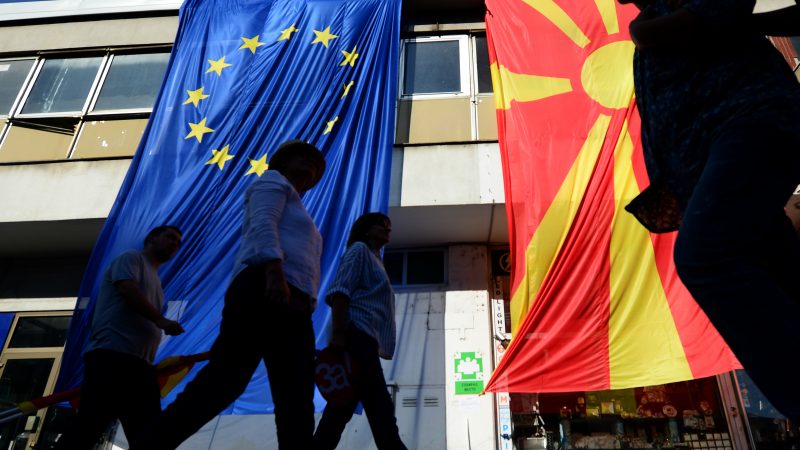Originally published by EURACTIV.
Macedonia is still going through a painful reconstruction as a society. But if we really believe that the Western Balkans region belongs in Europe, it is time to insist on respecting European values.
“The inconvenient truth is that, under these circumstances, it would be impossible today for Hungary to join the European Union. That is the reality,” said Guy Verhofstadt, one the most prominent Europhiles in the European Parliament and the president of ALDE group, during the debate on invoking Article 7 against Hungary.
The European Parliament held a much-needed and well-publicized debate on the state of affairs in Hungary, and the need to adopt punitive measures.
A comprehensive report, compiled and presented by Judith Sargentini (MEP), reveals serious problems in key areas such as judicial independence, corruption, data protection and freedom of expression.
It goes on to issues such as conflicts of interests where the prime minister’s son-in-law’s company was awarded 35 contracts with “serious irregularities”, perceived corruption of 89% and “insufficient safeguards against arbitrary interference with the right to privacy”, just to name a few.
Reading through it, I thought to myself: “What a waste of my time”. Because anyone who has ever been in opposition to an autocratic government in the Balkans can tell you: Autocratic regimes are all alike; every democratic society is “fair” in its own way.
But instead of dwelling on “a truth that is universally acknowledged”, the European Commission, and especially the High Representative Mogherini and Commissioner Hahn could do well to draw the lessons from this fascinating episode of parliamentary oversight and do their due diligence instead.
Not for the sake of this Commission or the upcoming elections, but for the sake of the generations 30 years from now.
There are plenty of aspiring Orbans at the gates of the European Union, and the way forward is not to postpone the problem until these countries are already in the EU and we are back to discussing whether invoking Article 7 is needed.
The European Union has the heftiest leverage right before countries join, when the process of adoption of the acquis communitaire takes place, during the so-called “accession negotiations”.
Instead of viewing these negotiations as a prescriptive adoption of numerous directives and regulations, it is time the Commission started treating them as a chance to help enshrine EU values at all levels. Don’t assume that because a country has a parliament, they are a democracy like Sweden or Germany.
There are plenty of examples all around the Balkans to disprove this.
Both Serbia and Montenegro, despite having started their accession negotiations, have serious problems in the areas of corruption, media freedom, judicial independence, and civil society.
The parties in power and their tactics have induced in both countries elements of “state capture”, where the difference between the party and the state becomes blurred. The state depends on the decisions of the party, or in most cases, the decision of the leader.
Freedom House’s Nations in Transit report from 2018 shows Serbia having the lowest Democracy score since 2003, making this the fourth consecutive year of democratic decline.
Issues during previous electoral cycles such as unbalanced media coverage, pressure on voters, or the use of state resources in campaign purposes have only worsened in the last election cycle.
Pressure on independent media is more severe, and the government remains hostile to critical voices from the civil society. And the worst-kept secret in the country remains the fact that President Vučić makes all the major decisions, with the government acting as a proxy.
Montenegro is further advanced in the accession negotiation, and yet it has also declined in the overall democracy ranking by Freedom House. The man who was in power, or effectively making decisions since the early 90’s, way before Montenegro gained independence, was re-elected as president this year.
The ruling party’s effective control over the national broadcasting service remains strong, and corruption perception ranks the country close to Hungary, with almost no high-level corruption cases prosecuted.
And yet, if one is to look at the enlargement strategy the European Commission published earlier this year, one can see that Serbia and Montenegro are frontrunners in the region, with possible accession in 2025, if there is “strong political will”. My only question is “How”?
If Hungary and its strongman of Central Europe are such a headache for Brussels today, why is the further erosion of democratic values in the Western Balkans overlooked to this extent by Brussels?
Geopolitics and bilateral issues certainly play a hand, to the great delight of the leading men of these countries. The fear of Russia gaining traction in the Western Balkans is as real a possibility as it is abused as an argument for short-term stability, in exchange for poor track record on democratic reforms. The need to move past the Serbia-Kosovo dispute is prevalent, but it cannot and should not come at the price of European values.
Finally, as a Macedonian, I remember my own country sliding back in every single aspect that shapes a democracy not so long ago, and the European Commission offering positive to somewhat positive progress reports stating that “the political criteria are sufficiently met” even as late as 2014, mere months before the biggest crisis in the country erupted.
This sweeping under the carpet did not help Macedonia and we lost years in the meantime.
It wasn’t easy for Macedonia to get back on track and we are still going through a painful reconstruction as a society. But, if we really mean it when we say that the Western Balkans belong to Europe and share a common history and culture, it is time we all insisted on respecting and living according to what we know today as “European values”.
And Brussels should be the natural leader.


0 comments